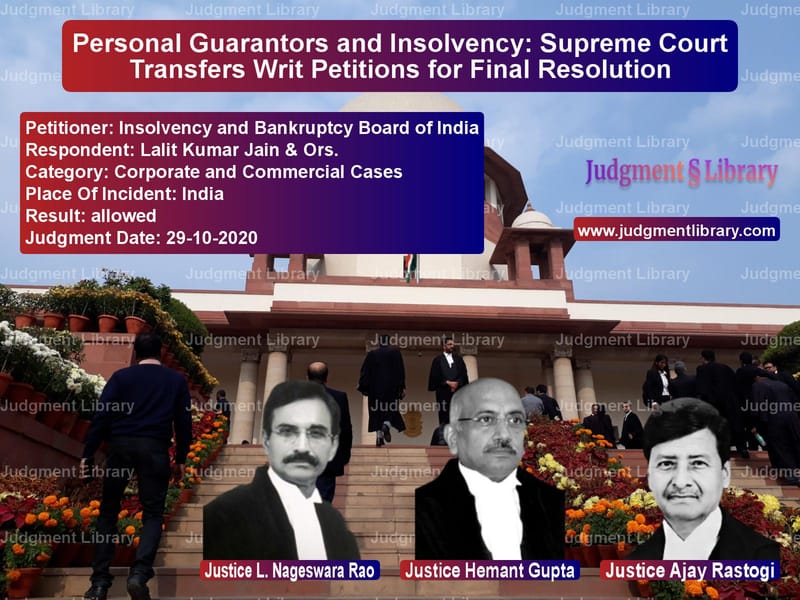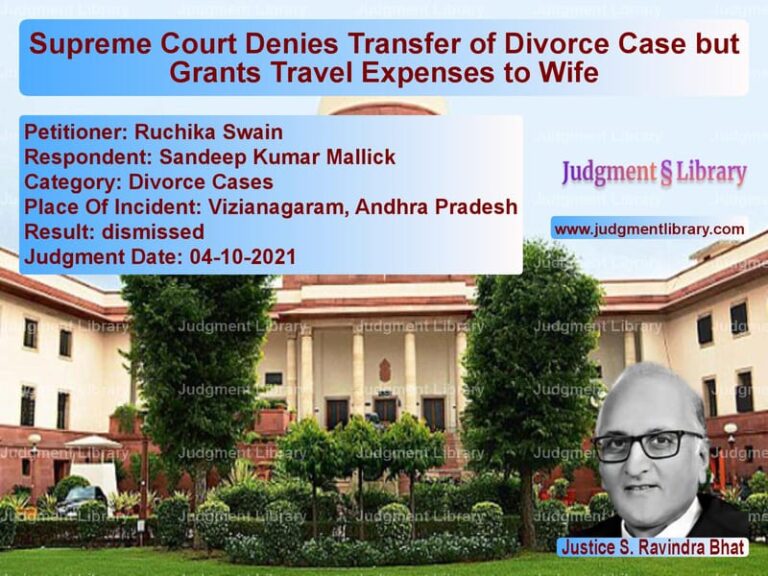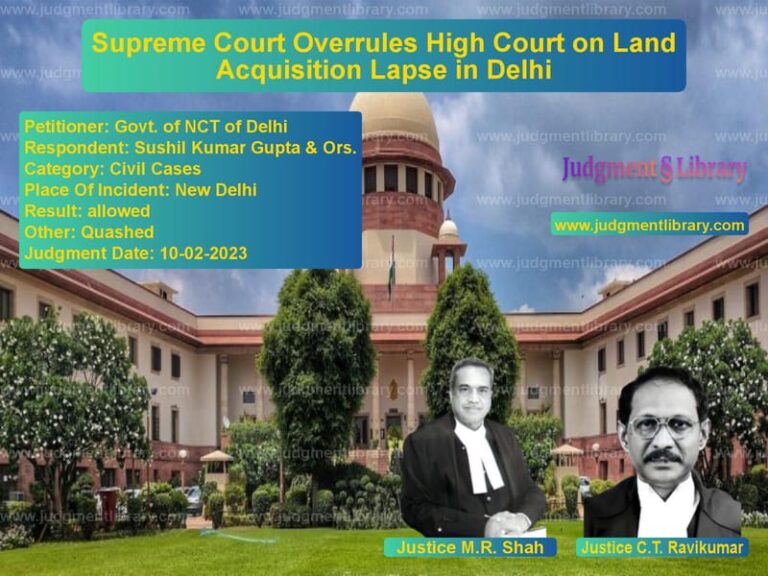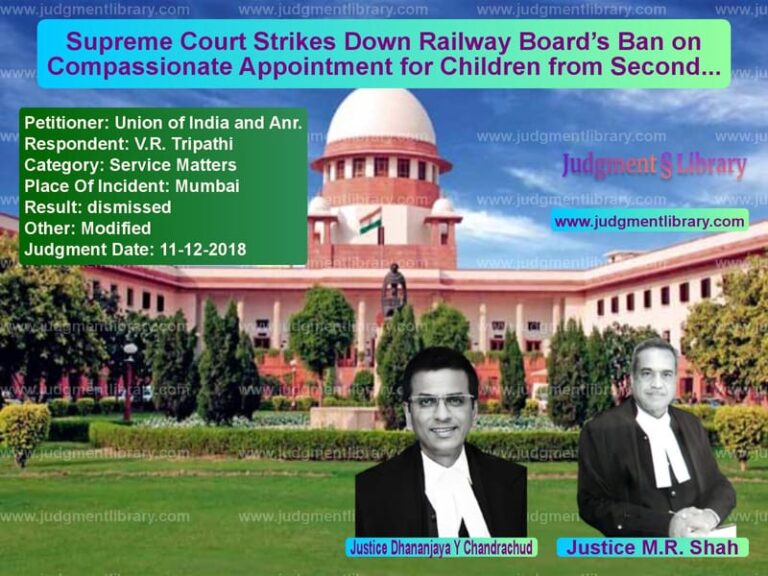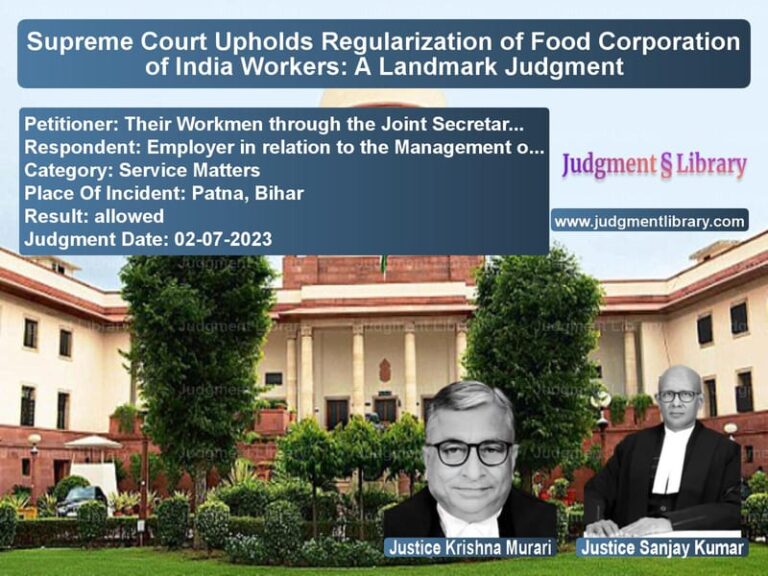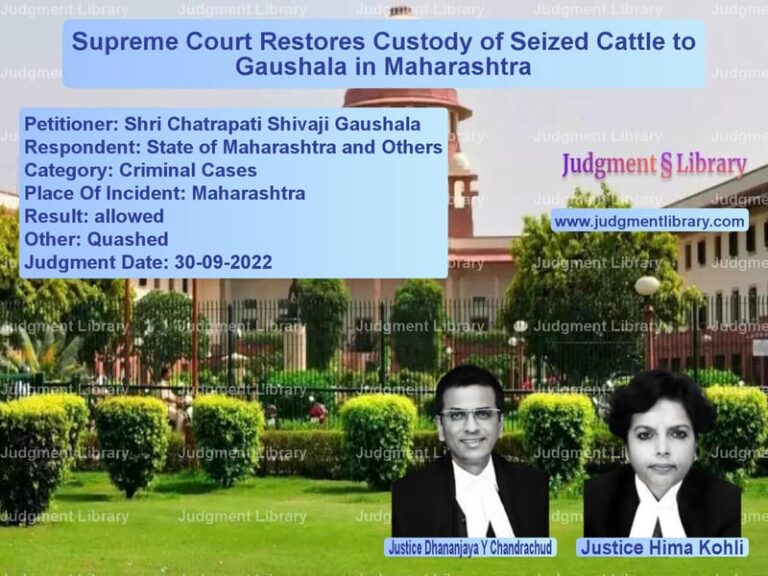Personal Guarantors and Insolvency: Supreme Court Transfers Writ Petitions for Final Resolution
The case of Insolvency and Bankruptcy Board of India vs. Lalit Kumar Jain & Ors. revolves around the legal question of personal guarantors under the Insolvency and Bankruptcy Code, 2016 (IBC). The Supreme Court was tasked with determining whether various writ petitions challenging the Notification dated 15.11.2019, which brought personal guarantors to corporate debtors under the purview of the IBC, should be transferred to the apex court for final resolution.
Background of the Case
The Ministry of Corporate Affairs, through a notification dated 15.11.2019, brought into force several provisions of the IBC that specifically dealt with personal guarantors of corporate debtors. This move was intended to enable creditors to initiate insolvency proceedings not just against corporate entities but also against individuals who had provided personal guarantees for corporate loans.
Provisions Brought into Force
The provisions made effective from 01.12.2019 included:
- Clause (e) of Section 2
- Section 78 (excluding fresh start process) and Section 79
- Sections 94 to 187 (inclusive)
- Specific clauses under Sections 239 and 240
- Section 249
Challenges in High Courts
Following this notification, several writ petitions were filed in different High Courts, including the Delhi High Court, challenging its validity. The petitioners sought a declaration that certain sections of the IBC, particularly Sections 95, 96, 99, 100, and 101, were unconstitutional as they applied to personal guarantors.
Arguments Presented by the Petitioner (Insolvency and Bankruptcy Board of India)
- Different High Courts hearing the same issue could lead to conflicting rulings, creating uncertainty.
- Given the importance of the matter, the Supreme Court should take it up for final determination.
- The matter requires an authoritative interpretation to ensure consistency in the implementation of IBC provisions.
Arguments from Respondents (Writ Petitioners)
- The Delhi High Court was already set to hear the matter on 10.11.2020, and the Supreme Court should allow it to proceed.
- Allowing High Courts to adjudicate would provide the Supreme Court with diverse perspectives before making a final decision.
- The Insolvency and Bankruptcy Board of India (IBBI) was not the appropriate petitioner; the Union of India should have filed for transfer.
- Transferring all cases to the Supreme Court could delay resolution instead of expediting it.
Supreme Court’s Analysis and Decision
1. Need for Consistency in Legal Interpretation
The Supreme Court recognized the significance of the issue and noted that leaving it to multiple High Courts could lead to varying interpretations. The Court stated:
“Transfer of the Writ Petitions to this Court would avoid conflicting decisions by the High Courts which are in seisin of the Writ Petitions.”
2. Ensuring a Uniform Application of the Insolvency Code
Considering that the IBC is still evolving, the Court emphasized the necessity of a single, authoritative ruling on the issue. It observed:
“The Insolvency and Bankruptcy Code is at a nascent stage and it is better that the interpretation of the provisions of the Code is taken up by this Court to avoid any confusion, and to authoritatively settle the law.”
3. Expediting Judicial Determination
The Court acknowledged the urgency of resolving the issue to prevent prolonged litigation. It directed:
“Considering the importance of the issues raised in the Writ Petitions which need finality of judicial determination at the earliest, it is just and proper that the Writ Petitions are transferred from the High Courts to this Court.”
4. Impact on Pending and Future Cases
To prevent further fragmentation of rulings, the Supreme Court ordered:
“No further Writ Petitions involving the challenge to the Notification dated 15.11.2019… shall be entertained by any High Court.”
Additionally, it ruled that any interim orders passed by High Courts would remain in effect until further notice.
Final Verdict
The Supreme Court allowed the transfer petitions, bringing all related writ petitions under its jurisdiction. This move ensures that the question of personal guarantors under the IBC will be addressed with finality by the highest court in the country.
Key Takeaways
- The Supreme Court will exclusively decide on the validity of the notification bringing personal guarantors under the IBC framework.
- This decision prevents conflicting judgments from different High Courts.
- The ruling reinforces the Supreme Court’s role in ensuring consistency in interpreting insolvency laws.
- Pending High Court orders remain effective until the Supreme Court delivers its final ruling.
This case marks a crucial moment in the evolution of India’s insolvency framework, as it determines the fate of personal guarantors under the IBC.
Petitioner Name: Insolvency and Bankruptcy Board of India.Respondent Name: Lalit Kumar Jain & Ors..Judgment By: Justice L. Nageswara Rao, Justice Hemant Gupta, Justice Ajay Rastogi.Place Of Incident: India.Judgment Date: 29-10-2020.
Don’t miss out on the full details! Download the complete judgment in PDF format below and gain valuable insights instantly!
Download Judgment: Insolvency and Bankr vs Lalit Kumar Jain & O Supreme Court of India Judgment Dated 29-10-2020.pdf
Direct Downlaod Judgment: Direct downlaod this Judgment
See all petitions in Bankruptcy and Insolvency
See all petitions in Corporate Compliance
See all petitions in Judgment by L. Nageswara Rao
See all petitions in Judgment by Hemant Gupta
See all petitions in Judgment by Ajay Rastogi
See all petitions in allowed
See all petitions in supreme court of India judgments October 2020
See all petitions in 2020 judgments
See all posts in Corporate and Commercial Cases Category
See all allowed petitions in Corporate and Commercial Cases Category
See all Dismissed petitions in Corporate and Commercial Cases Category
See all partially allowed petitions in Corporate and Commercial Cases Category

